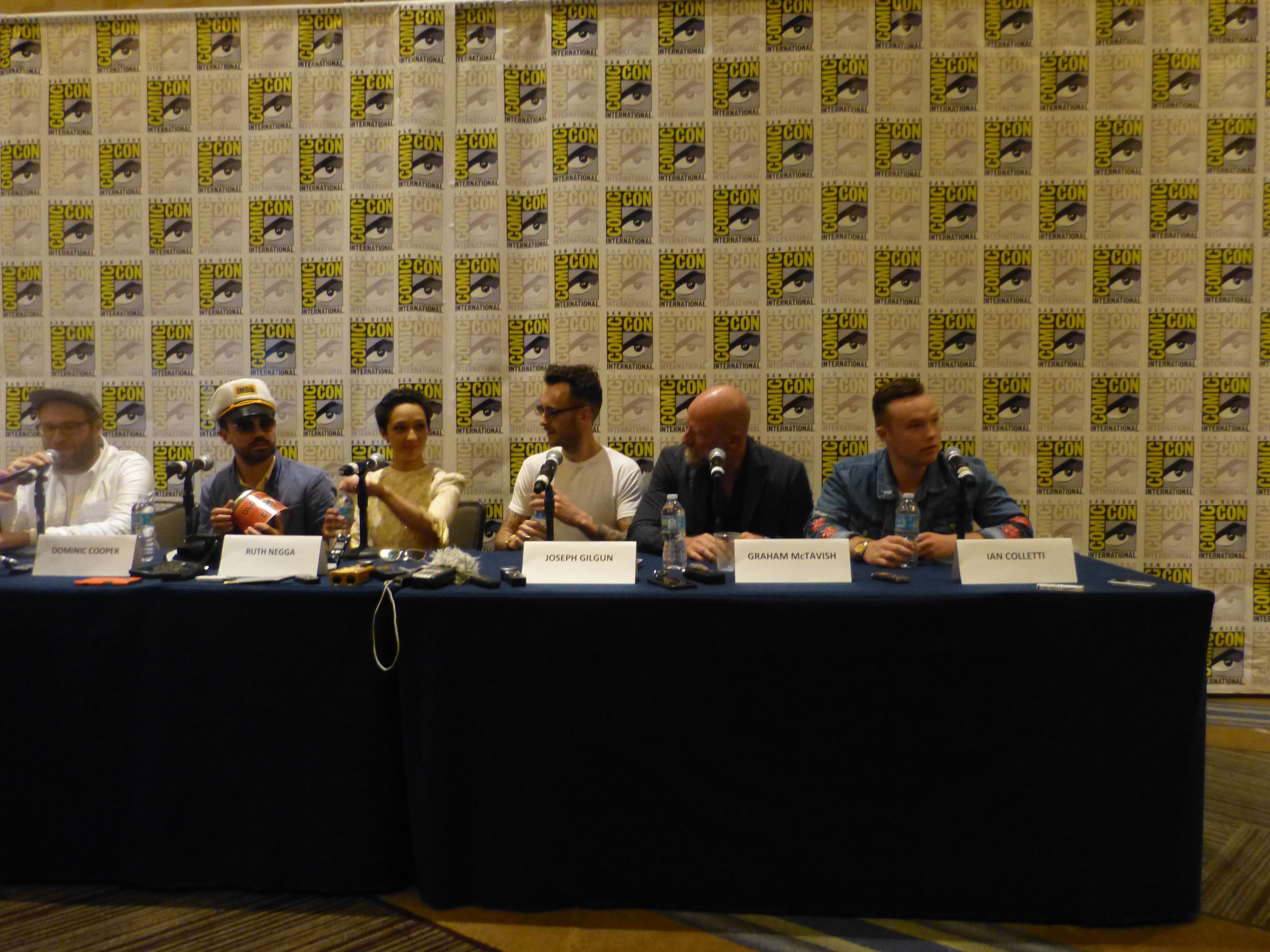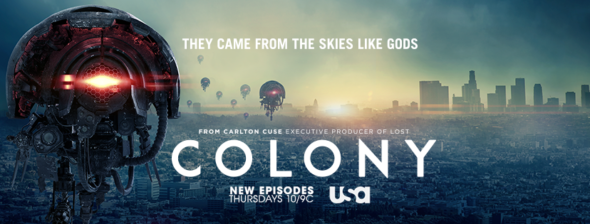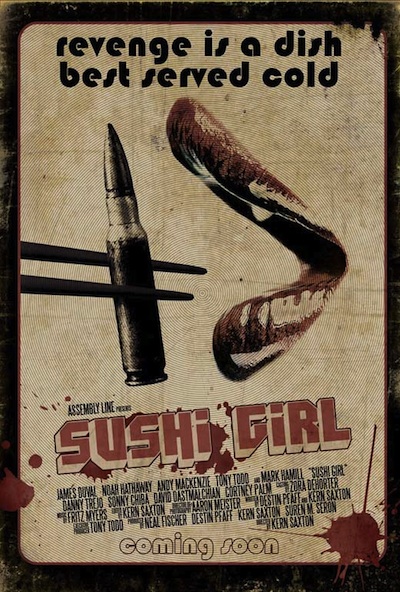We got a chance to attend the Preacher press conference and speak to the cast, including Dominic Cooper (Jessie), Ruth Negga (Tulip), Joe Gilgun (Cassidy), Ian Colletti (Arseface/Eugene), Graham McTavish (Saint of Killers), and executive producer Seth Rogan. There were many reporters from several outlets in the room with questions. And if you want to listen to the press conference yourself, click the link at the bottom.
Reporter:
I know that Tulip and Jesse are kind of meant to be, but Cassidy is over there waiting in the wings whenever Jesse messes up. Is there any hope for the two of them?
Joe Gilgun:
Yeah, he’s like a turd that won’t flush, Cassidy. That relationship is constantly waiting. Well, anyway, he is waiting, he loves her. Its unrequited love, it’s the worst, I know that feeling, I think everyone’s had that at some stage. And it’s really long and drawn out for him, it’s a bloody shame. And he wants to be honest, he wants to be honest with his friend as well, about what he’s done. I don’t think Cassidy understands Jesse like Tulip does. Tulip’s seen that side of him where … I think, I don’t know though, I think … I don’t have much to say without completely fucking ruining Preacher right now. But yeah, he definitely, he loves her man, and he absolutely adores Tulip and I think he just wishes Jesse maybe appreciated her a little bit more as well. He struggles with that.
Ruth Negga:
I think the dynamic is interesting, isn’t it because … Feels like those kind of male and female roles are sort of reversed because he doesn’t, he wants to be honest and have the kind of conversation… Pour his heart out and have a night in and talk about his feelings. And Tulip’s like, “No, I don’t want to do that actually, I’d like to keep that compartmentalized somewhere else.” Which is usually, you don’t really see that do you? But Tulip very much if it’s not broke, don’t fix it. We don’t need to talk about it.
And I love that dynamic, and that tension is very constant. It’s a constant theme because I think for Tulip, what I love about her is she doesn’t think it’s necessary to reveal everything. That she’s had a life outside of him and that’s not healthy, but it’s part of her. And I think we see all of those kind of unhealthy bits of her as sort of laid bare this season. Especially in terms of what she’s been doing when she hasn’t been with Jesse.
Reporter:
My question is for Ruth, I really like how multi-faceted Tulip is and I was wondering about your approach to having a very … I guess being a badass is often associated with masculine traits, and people associate with men, but in many ways Tulip is a very blatant badass and I guess you could say a traditional sense but she’s also a very feminine character as well and with the introduction of more of the plot line with having a child or not having a child, what are your thoughts and feelings on the multi-faceted-ness of that?
Ruth Negga:
Well, I remember very distinctly, it was in our panel last year, I remember Seth, you said, “Well she’s a human being.” She wanted to portray a human being. I think that’s what we do. And I think those turns must be feminine. We define women along the men, and I don’t really think that that’s done us any favors. Because we share it with them, as human beings, and I think that’s what I want to do in my world. And I think that’s what we want to do is just portray humans with everything that they are, that we can be.
Reporter:
Mr. Rogen, the show is fantastic. I was wondering if you could talk about the latest Hitler scene and having Eugene participate in beating the crap out of him and how within that episode … Also, Hitler almost becomes a sympathetic character. Could you just talk about that decision?
Seth Rogen:
Yeah, that last scene, I mean, I don’t want to ruin what happens basically, but yeah, I mean, we were definitely trying to play with the ideas of redemption and rehabilitation I guess, and if there is a hell, then what’s the point of it? Is something I talked a lot about. Could you change in hell? Is there a point to changing in hell? Is it bad to change in hell? Because if you act good then that kind of goes against the nature of hell…And it’s much more interesting to kind of explore … Like Ruth was saying, they’re all people, even Hitler was a person. The worst one at that, but if you’re kind of embracing the idea, which we did, of having him be a character on our TV show then we thought we should treat him like any other character as far as the thought we put into him goes. And for Eugene, again, it’s kind of like he’s nice to him, he inherently believes Christian philosophy of forgiveness and things like that. But he’s in hell, which he also believes in, and he’s Hitler so, there’s a lot of things going on there. It all adds up nicely. That’s all I guess I’ll say here. It’s weird though.
Reporter:
The show’s really hit its stride this season, the episodes have just been remarkable, but is that just a case of getting more familiar with the process, or just getting everybody out on the road?
Joe Gilgun:
I think we were all very, really comfortable with one another and the characters now, there’s a bit more breathability and I remember in the pilot certainly and in the first series, we were still really finding the direction we wanted to take these characters in. And I think this year around, there’s much more trust, it feels much more like a collaboration and you feel like you can invest a piece of yourself into it. I certainly feel that way.
Dominic Cooper:
The writers getting to know us as well. You could feel, you could sense that they know the kind of work we enjoy doing in the sense of the characters that we’re portraying and how we’re portraying them and they enjoy writing for us for that reason.
Seth Rogen:
Yeah, we’ve been able to accomplish a lot with not a ton of resources. The first season we’re kind of like caught compressing the sprain and this season we’re really letting it go. We always knew that was kind of going to happen, it’s a weird strategy, in retrospect, because we could’ve just been canceled. That would’ve been really frustrating. In the end, we weren’t. So, we got to do the thing that we kind of were slowly building toward, some would maybe argue too slowly, but we are where we are. The thing in the end we kept saying, throughout the first season there’s maybe a dozen moments where when you look at them, you’re like wow, that shit can only happen on one thing on earth and that thing is the TV show Preacher.
And then me and Evan were like, “What if there was two hundred things like that instead of just a dozen?” And that was something we really encouraged the writers to try to do, is indulge in the tone, and take big, crazy swings, and not be afraid to try to be funny, or irreverent, and really try to push the boundaries of the tone of the show as much as humanly possible, basically.
Reporter:
My question is for Dominic. In the last episode especially, Jesse went extremely dark and darker than we’ve ever seen him. So, where do you think that darkness comes from and how did you enjoy or dislike playing that darkness?
Dominic Cooper:
I’ve always been aware that he possesses that darkness and I think it comes from an incredible amount of guilt that he harbors about the death of his father and the responsibility of the death of his father. And from a life living with the most crazy people that have ever been portrayed in anything I’ve ever seen. They’re living in a coffin, under a swamp, as we saw in the comics, it’s a bad form of behavioral —
Joe Gilgun: It’s not good for child development.
Seth Rogen: Yeah, I’m writing a book that supports it actually.
Dominic Cooper:
He has that darkness, that darkness is constantly bubbling under the surface. And there are certain things, and one thing, which will really infuriate him and reveal that darkness is any danger towards the person he loves more than anything in the world, which is Tulip. Because that’s the only family he has and it’s the only family he’s ever known. So I think when he finds out about the … Is that what you mean, finding out about the marriage and the disloyalty of that and knowing about it and the other things that happened in the past, I think he sees … The saying when someone sees red, really it goes blank for him and I think he can become extremely volatile and dangerous and quite nasty.
And the more the writers write about him, the more is revealed about him, the more he terrifies me in his inability to see compassion or his use of Genesis often astounds me. Because he doesn’t do it sometimes to help his best mate in a time of need, but he’ll use it sort of sporadically and without warning and sometimes for fun. And so, it’s a kind of schizophrenic nature to him is that he’s sort of all over the place. And that I think will go much further and become more and more unsettling as the seasons progresses.
Reporter:
Seth, this question is for you. As far as boundaries go, that you were speaking about in the writer’s room, do you ever find yourself having to kind of sit down with them and see and try to convince them to do certain scenes? Like bringing Hitler on, and even the design of Ian’s makeup application as Arseface. Are there those meetings, do they happen? Do you have to convince them?
Seth Rogen:
Yeah, they’re phone calls, normally. No one wants to look at each other in the eye when they’re discussing this shit. But there have been a few of them, Ian’s thing was not one of them, actually, they were okay with that. Hitler, yeah, that required a few conversations. But they more just want to kick the tires I guess you’d say, and make sure there is kind of thought behind it, and a plan, an overall kind of plan behind it, and that it’s not just us doing it because we think it’s funny or incendiary or something like that. Yeah, blowing up Tom Cruise took maybe two conversations. There have been a couple things, there’s a few things that maybe haven’t happened yet…when I watch the show, like most things I’ve done throughout my life, I’m shocked people were able to get away with, not what we’re not able to get away with. The things we’ve been stopped from doing are … Pale in comparison to the things we’ve actually done and so that is something that I’m constantly just surprised by. What they let us do, yeah, it’s crazy. Hitler was a character on our show.
Reporter:
This is for Ian, I’m curious what the process is like to turn into this character and sort of, I love the fact that we finally got to see exactly how that all happened.
Ian Coletti:
It’s a pretty crazy process, it takes about two hours to get into everything every morning. It’s a one time each thing, I can use it one day, it’s goop on my face and we take it off and it’s a smelly, disgusting mess by the end of it. The guys at K&B designed it and it’s incredible. I’m so amazed at how real it looks, even on set, I remember last season, [a guy who] wasn’t on the show or maybe he’d seen me come up and he was just like, “Oh, thank you for your service.” I’m like, whoa, whoa, whoa, hey, I’m not in the military…
Reporter:
One is for Joe and Graham. Which of you is the more badass vampire? Because you’ve [Graham] played Dracula now.
Graham McTavish: Oh, right.
Joe Gilgun: We should have a vampire off one day.
Graham McTavish: We will. We’ll have … We can do it later on, actually.
Joe Gilgun: Let’s have a romping vampire off on the beach. Join us all on the beach later on for a romping vampire …
Graham McTavish: Both kind of romantic vampires as well though.
Joe Gilgun: And he’s a very gentle lover. Very, very gentle.
Graham McTavish: And vampires get a bad rap for that.
Joe Gilgun: Yeah, they do. They’re not all bad.
Graham McTavish: We’re not all bad. So …
Reporter:
How was it to film that awesome sequence on the highway in the first episode of the season?
Seth Rogen:
It was fun. We planned it intensely, that’s the only way to really do something like that, is to meticulously plan every single shot of it. So me and Ed would storyboard a lot, and spent a lot of time playing with toys and figures and making sure that the physicality of the sequence makes sense and then we show everyone our storyboards and we’re like, “This is you, running across over here, and then you go behind the car and now over here, this is you Joe, you’re getting shot at over here” and then you literally go through it, shot by shot.
Not in order, we shot in order the first of two days, I want to say, the whole, everything on the road was two days, which was pretty crazy, I’m shocked we … And the effects, it’s like a real … Everyone coming together, the effects guys were amazing, we’ve got a very strong crew. And then with the first two days of the entire season, we nearly threw people into the boiling water as far as that goes, but it was fun. And I love doing that stuff.
And that’s for me, had to be one of the most fun things about directing the show, is that we get to do things that you don’t see directing or coming up in comedies, we didn’t just do a lot of. So, it’s fun for us to do entirely different types of sequences and work with actors that didn’t come up in an improvisational comedy background, and they’ve taught us a ton about directing honestly, because we’re like, “Oh, they’re the first real actors that we’ve directed in a lot of ways” as far as having a very acting background and not people we were friends with for years and years and years that we could just kind of … We had to talk to them like actors, which was really interesting and educational, and I think very helpful for us as directors.
Reporter:
I was just wondering, how much was planned about season two before you knew specifically whether it was going ahead. Particularly the story between Ruth and Jessie wanting a baby. Given where we meet them in the pilot, was that even part of the backstory always coming or did it sort of come afterwards and then you played back to it in flashbacks.
Seth Rogen:
The birth control thing? No, I don’t think that was maybe thought of last season honestly, I can’t remember. We knew the whole thing with what happened at the bank robbery and losing the baby and all that stuff. But I don’t know, I honestly can’t remember if that was all of the …
Dominic Cooper:
We didn’t know, it was quite, it was interesting revealing it. And it informed our relationship in it. And it informed, made it much more complicated because that one scene I think in the last one that just played out where you see us back in the past in the apartment, it’s like the final breakup and it’s the end of the relationship. And it’s quite moving and you can see why they just have to go their separate directions. And they’ve tried very hard to start a new life and they’ve tried to go on the straight and narrow, they’ve lived the criminal life a bit and it hasn’t worked out for them. It informed all the stuff that happens later on.
Ruth Negga: When we were filming it, it was quite emotional days, weren’t they?
Dominic Cooper: Yeah.
Ruth Negga:
But I felt it was a really interesting dissection of a relationship that’s in free fall and when two people can’t communicate and what that does. And how it changes you and how something so big and so intimate can be so explosively divisive. It can shift these two people so far away from one another, it’s, I did really love that storyline because I thought, this is real life. This is what happens, is that sometimes these things can do that, and they can shift your soulmate so far away, that there is no communication and that’s, you’ve reached a cul-de-sac for now. And that the only way to go … When they leave, they don’t look at one another, and I think that’s what happens, that’s real heartbreak and I think these traumatic things, that’s what it does to even the most intimate relationships.
Reporter:
This is for Graham McTavish. Your story in the last season that we had, with your personal hell was one of the most darkest moments of the first season. How did that influence you in the way you portray your character?
Graham McTavish:
He goes through such an extraordinary trauma with his family and you could argue that perhaps that the journey he embarks on in season two, he’s made this deal with Fiore to get back Genesis. And doing so, indirectly I suppose, he would be killing Jesse Custer. He has no personal animosity towards him at all. He’s a means to an end, so I had to try to find a human reason for all of it, really. And for me, and it’s possibly a little eccentric to say this but, it became a journey motivated by love for him as much as anything else, because he wanted to be reunited with his family and this was the only way he could do it. Now, yeah, he does take a rather heavy-handed approach to it. Hurts a lot of people, that get in his way and they all die, I always feel very sorry for guest actors on the show, because …
Seth Rogen: (Laughs) I’ll be killing you today.
Graham McTavish:
But it’s great fun, it’s great fun to play that character and I like the … I said earlier today to somebody that it’s like that nightmare you can’t wake up from that we’ve all had. Where you’re being pursued by something and you cannot get away from it. And that nightmare is me, I guess. I am that person pursuing you down the road and the fact that he walks everywhere, and he doesn’t even walk quickly. It’s just, that’s just so much more intimidating.
I mean if he was at a brisk pace going down the road, looking like he really had to get somewhere fast, that wouldn’t be nearly as frightening. Doesn’t help having the sword of course, because the sword is quite an encumbrance.
It’s a wonderful character to portray and he’s got some interesting stuff coming up for the rest of the season. In terms of his own pain, the heaven and hell that he carries around with him, and all of these characters, I think do. That’s what I think … Genuinely, that’s what I find so interesting both about the TV show and the comics is they deal with that subject. A subject that is universal, they just happen to set it in a kind of fantastical universe where people have asses on their faces.
Reporter:
My question is for Seth. I love the musical score in the show and especially in the second season. Where did that come from?
Seth Rogen:
Yeah, well, Dave Horner does the music. He’s great, he did the music for Breaking Bad, is where we first heard his music. He did the music for The Disaster Artist as well. He’s someone that we really got along with, me and Evan like not very subtle scores. A lot of people like score that you can’t even notice it. We like the opposite score, a real part of the experience and you know it’s there and we’re always in there like, “More! Bum-bum-bum” I remember the scene, the Killer’s music, it should be insane, it should just be horrifying and a lot, it shouldn’t be subtle at all. And we always say we’re not very subtle directors especially on Preacher.
The material allows for a somewhat indulgent/heavy-handed directorial approach at times because it’s so crazy. And it doesn’t push the boundaries a bit really as long as you anchor it with scenes and with the performances and things like that.
But the score, yeah, we like a lot of music that you can really hear and that you’re really aware of and that … We generally don’t … We’re always telling them to not use music in times where they think they should use it and that’s why we’re generally like if we’re going to use it, it should be at ten. We hate the get you though the scene music, we try to never do that. We try to do … if there’s music, you’re gonna hear it, there’s going to be a reason for it, basically. But Dave Horner is great.
Reporter:
This question is for Seth. I love the appearance of God. Is God going to show up more in season two? And then, if God were to come down from Heaven here in this room, for the actors, what would you say about him?
Seth Rogen: What if God was one of us
Joe Gilgun: Where the fuck have you been? What’s the deal, man?
Graham McTavish: Maybe he’s here already.
Dominic Cooper: Have you been asleep?
Joe Gilgun: Just chilling, playing some Call of Duty.
Seth Rogen: I can’t answer, I mean … The pursuit for God remains a prominent part of the show this season. And yeah, I’d say, “God, yo, what’s up man?”
Ruth Negga: What’s the fucking story?
Reporter:
My question is for Ruth. Tulip has made it very clear throughout this season that she does not like Jesse using Genesis at all. How do you think Tulip is going to respond now that she knows Luther has not been killed, to Jesse using Genesis on her?
Ruth Negga:
Not well. No, I think the reason she doesn’t like the use of Genesis … I think she understands the arbitrate nature of power. I think she has an innate sense of decency and fairness. And I think for her, his use of Genesis, she’s very suspicious of it, because I think she understands if you have an authority, you must use it wisely and I think she really doesn’t understand the way he can just arbitrarily use it on anybody. If there’s a fight, she wants it to be a fair fight. I think that she’s always had … The scales of justice for her should be balanced even though she’s a notorious criminal. But I think always think she’s sort of … She’s rolled ahead rather with the sheriff and I think she sees Genesis as being part of the sheriff world and it’s not fair to her.
Reporter: Seth, I have a question for you. You always direct, seen you edit, you have so much power …
Seth Rogen: (Laughs), Yes.
Reporter:
Creatively it must be awesome, but with that power comes a lot of responsibility, directors make some shitty decisions along the way, so what as directors working on this show or anything you guys have done, what’s the shittiest thing you’ve had to do?
Seth Rogen:
I mean, in what way? Personally? I had to talk a girl into pretending to be Michael Cera’s ass, that was kind of shitty. There’s scenes like that, that was awkward … I didn’t talk to her … She was more than happy to … It was an awkward scene to direct. There’s awkward scenes to direct, it’s never that bad, I think we have a good demeanor on set, I think we try to …
Joe Gilgun: I had to piss in front of you, didn’t I in that box.
Seth Rogen:
We made Joe piss himself one time, because we wouldn’t let him have … In the pilot there’s a scene where, this is going to make me sound like a lunatic, but there’s a scene where he’s landed after jumping out of an airplane and splattered in a field basically, so he’s in the bottom of a crater with his guts out. And to shoot it, he was barely in a hole with a prosthetic thing. And it took him a good forty-five minutes to get in and out of the hole and we were kind of fucked for time and the sun was going down and he’s like, “I have to get out of the hole and piss.” And I’m like, “You’re not getting out of that hole to piss.” I love you and I made him piss himself while he was in the hole.
Joe Gilgun: I pissed my pants man, I pissed my pants in the desert. It was a dark moment. Tons of crew just going about their business.
Seth Rogen:
Just pretend it’s not happening. Everyone knew too. That was all a … If he actually cared, I wouldn’t have made him do it. He was in on the joke I think.
Joe Gilgun: : Sure.
Seth Rogen:
It’s a good lesson in time efficiency, you don’t have time to do these things, you go in with these lofty plans sometimes and if anything goes wrong at all, then the whole plan goes out the window. But I think that’s kind of the challenge in television, is making it look interesting while shooting things basically in as few shots as humanly possible. It’s not shitty, I love directing this show, and directing in general is a fantastic job, and is really fun and I hope I get to keep doing it.
Don’t forget to click the link below if you want to listen to the full press conference.
Podcast: Play in new window | Download
Subscribe: Apple Podcasts | RSS














